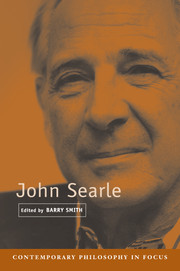Book contents
- Frontmatter
- Contents
- List of Contributors
- 1 John Searle: From Speech Acts to Social Reality
- 2 From Speech Acts to Speech Activity
- 3 Intentions, Promises, and Obligations
- 4 Law
- 5 Action
- 6 Consciousness
- 7 The Intentionality of Perception
- 8 Sense Data
- 9 The Limits of Expressibility
- 10 The Chinese Room Argument
- 11 Searle, Derrida, and the Ends of Phenomenology
- Further Reading
- Index
5 - Action
Published online by Cambridge University Press: 05 June 2012
- Frontmatter
- Contents
- List of Contributors
- 1 John Searle: From Speech Acts to Social Reality
- 2 From Speech Acts to Speech Activity
- 3 Intentions, Promises, and Obligations
- 4 Law
- 5 Action
- 6 Consciousness
- 7 The Intentionality of Perception
- 8 Sense Data
- 9 The Limits of Expressibility
- 10 The Chinese Room Argument
- 11 Searle, Derrida, and the Ends of Phenomenology
- Further Reading
- Index
Summary
Among the many important new views developed in Searle's Intentionality is an innovative theory of action. This theory involves two kinds of claims. First, it suggests that action itself (rather than the beliefs and desires that might contribute to causing it) has a general structure common to all of the Intentional states, and a specific causal-reflexive structure that it shares with perception and memory. Second, it explores the way in which actions performed without a prior intention are still intentional, and share in part the same structure as planned actions. The combination of these two features allows one and the same theory to account for embodied action, for dependence of content on context, and for metacognition, in an impressively economic way. The goal of this chapter will be to explore the several facets of this theory of action. We will also suggest some possible extensions.
John Searle's project in Intentionality is to accommodate action within this general approach. The mental state of intending to act, too, he wants to understand within the framework of a theory of Intentionality, that is, a theory of the central features that constitute representations as conditions of satisfaction. There is indeed a promising analogy between intending and other mental states such as desire and belief. Just as a perception is veridical, a belief is true, a desire is fulfilled, if and only if the states of affairs they represent obtain, so, similarly, an intention is carried out if a change in the world occurs as required by its conditions of satisfaction.
- Type
- Chapter
- Information
- John Searle , pp. 102 - 127Publisher: Cambridge University PressPrint publication year: 2003
- 3
- Cited by

